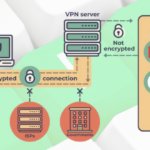VPN stands for “virtual private network” A VPN is a cyber security tool that encrypts your internet connection to hide your location and stop others from intercepting your web traffic.
Imagine you’re in a coffee shop, and you want to connect to the internet to check your email and browse the web. When you use the coffee shop’s public Wi-Fi network without a VPN, here’s what happens:
Without a VPN: Your data travels from your device to the coffee shop’s Wi-Fi router without encryption. This means that if a hacker is on the same network, they could potentially intercept and see the data you’re transmitting, such as your login credentials, emails, or other sensitive information.
Now, let’s see how using a VPN can make a difference: With a VPN: You activate your VPN app and connect to a VPN server located in a different city or even a different country. Once connected to the VPN server, here’s what happens:
- Your data is encrypted: Any data you send or receive is encrypted, making it unreadable to anyone trying to intercept it.
- Your IP address is hidden: Websites and online services you visit will see the IP address of the VPN server, not your actual IP address. This provides anonymity and privacy.
So, in the VPN scenario, your online activities are more secure and private: Hackers on the coffee shop’s network can’t easily intercept your data because it’s encrypted. Websites and services won’t see your true location but will think you’re connecting from the VPN server’s location.
This is especially useful if you want to protect your online privacy. It’s like creating a secure tunnel for your internet traffic, shielding it from prying eyes and potential threats.
Here are a few more examples of how VPNs can be useful in various real-life scenarios:
Online Shopping: When shopping online, some retailers may display different prices or offers based on your location. By using a VPN to connect to a server in a different region or country, you might find better deals and save money on your purchases.
Working Remotely: Many people now work remotely, and businesses use VPNs to ensure the security of their employees’ connections. If you’re working from home and need to access your company’s internal network or servers, a VPN allows you to do so securely.
Bypassing Censorship: In countries with strict internet censorship, people use VPNs to access blocked websites and communicate more freely. By connecting to a VPN server outside their country, they can bypass government-imposed restrictions.
Privacy at Public Hotspots: When you’re at a public Wi-Fi hotspot, like an airport or a hotel, you can use a VPN to protect your data from potential eavesdroppers. This is important because public Wi-Fi networks are often less secure and more susceptible to hacking.
Gaming: Gamers can use VPNs to reduce lag and improve their gaming experience by connecting to servers closer to the game’s server locations.
Torrenting: While we should emphasize that downloading copyrighted material without proper authorization is illegal in many jurisdictions, some people use VPNs for privacy while torrenting legitimate files. A VPN helps hide your IP address while sharing or downloading files via peer-to-peer networks.
In conclusion, VPNs are not just a piece of technology; they are your shield against the ever-present threats in the digital world. They enable you to surf the web securely, privately, and without borders. Whether you’re safeguarding sensitive data, accessing geo-restricted content, or simply seeking peace of mind online, a VPN is an invaluable companion in your digital journey.



